Entrepreneurship and Small Business: Venture Types & Impact on UK
VerifiedAdded on 2023/01/04
|16
|4604
|22
Report
AI Summary
This report provides a comprehensive analysis of entrepreneurship and small business management, focusing on different types of entrepreneurial ventures and their relation to the typology of entrepreneurship. It explores the similarities and differences between various entrepreneurial ventures, highlighting their impact on the economy, particularly the role of micro and small businesses. The report interprets data illustrating the economic contributions of these businesses and emphasizes the importance of start-ups in social economy growth. Furthermore, it identifies the characteristic traits and skills of successful entrepreneurs, differentiating them from other business managers, and assesses how entrepreneurial personality reflects motivation and mindset. Finally, it examines how background and experience can either hinder or foster entrepreneurship, using relevant examples to support the analysis. The document is available on Desklib, a platform offering study tools for students.

Entrepreneurship and
Small Business
Management
Small Business
Management
Paraphrase This Document
Need a fresh take? Get an instant paraphrase of this document with our AI Paraphraser
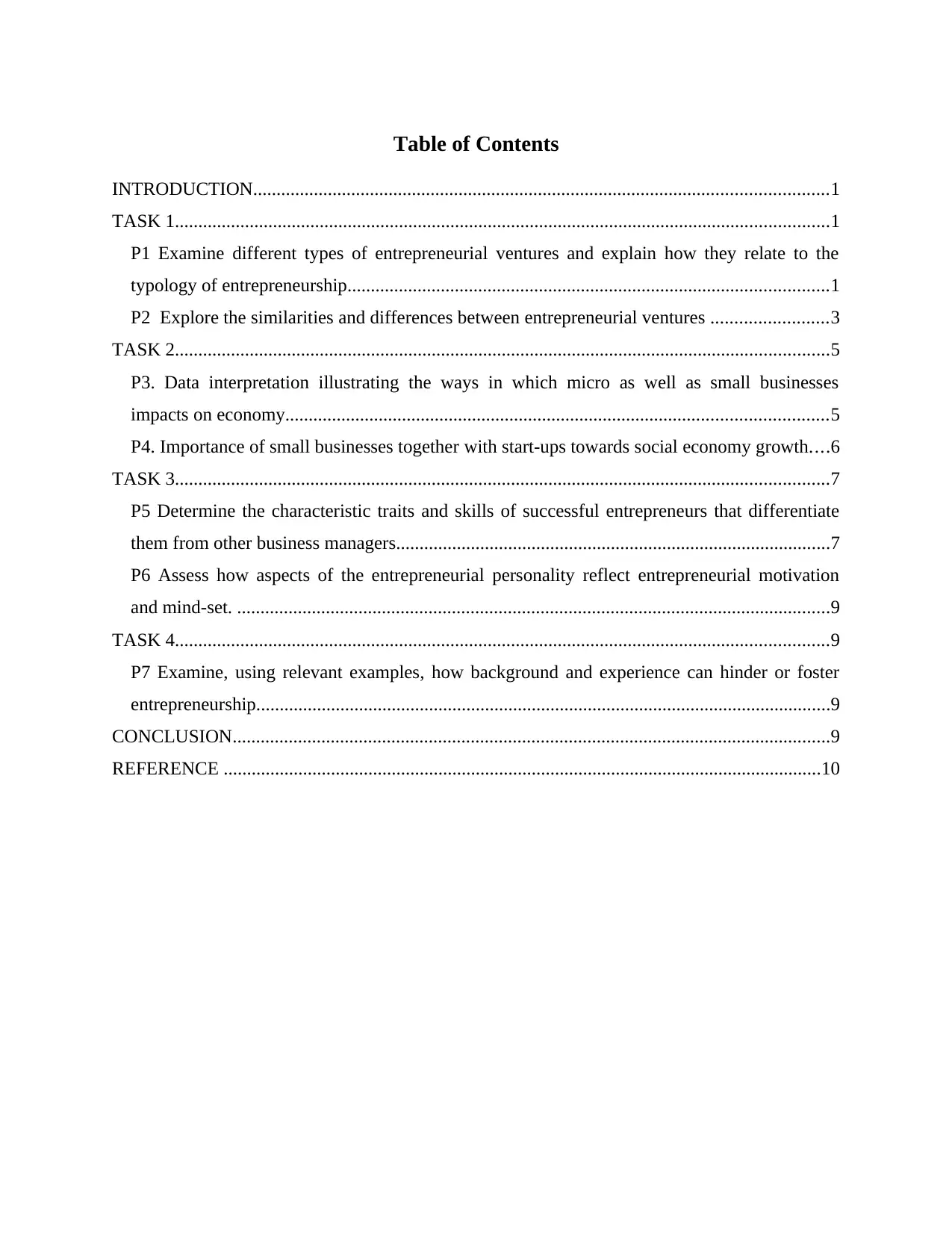
Table of Contents
INTRODUCTION...........................................................................................................................1
TASK 1............................................................................................................................................1
P1 Examine different types of entrepreneurial ventures and explain how they relate to the
typology of entrepreneurship.......................................................................................................1
P2 Explore the similarities and differences between entrepreneurial ventures .........................3
TASK 2............................................................................................................................................5
P3. Data interpretation illustrating the ways in which micro as well as small businesses
impacts on economy....................................................................................................................5
P4. Importance of small businesses together with start-ups towards social economy growth....6
TASK 3............................................................................................................................................7
P5 Determine the characteristic traits and skills of successful entrepreneurs that differentiate
them from other business managers.............................................................................................7
P6 Assess how aspects of the entrepreneurial personality reflect entrepreneurial motivation
and mind-set. ...............................................................................................................................9
TASK 4............................................................................................................................................9
P7 Examine, using relevant examples, how background and experience can hinder or foster
entrepreneurship...........................................................................................................................9
CONCLUSION................................................................................................................................9
REFERENCE ................................................................................................................................10
INTRODUCTION...........................................................................................................................1
TASK 1............................................................................................................................................1
P1 Examine different types of entrepreneurial ventures and explain how they relate to the
typology of entrepreneurship.......................................................................................................1
P2 Explore the similarities and differences between entrepreneurial ventures .........................3
TASK 2............................................................................................................................................5
P3. Data interpretation illustrating the ways in which micro as well as small businesses
impacts on economy....................................................................................................................5
P4. Importance of small businesses together with start-ups towards social economy growth....6
TASK 3............................................................................................................................................7
P5 Determine the characteristic traits and skills of successful entrepreneurs that differentiate
them from other business managers.............................................................................................7
P6 Assess how aspects of the entrepreneurial personality reflect entrepreneurial motivation
and mind-set. ...............................................................................................................................9
TASK 4............................................................................................................................................9
P7 Examine, using relevant examples, how background and experience can hinder or foster
entrepreneurship...........................................................................................................................9
CONCLUSION................................................................................................................................9
REFERENCE ................................................................................................................................10

⊘ This is a preview!⊘
Do you want full access?
Subscribe today to unlock all pages.

Trusted by 1+ million students worldwide
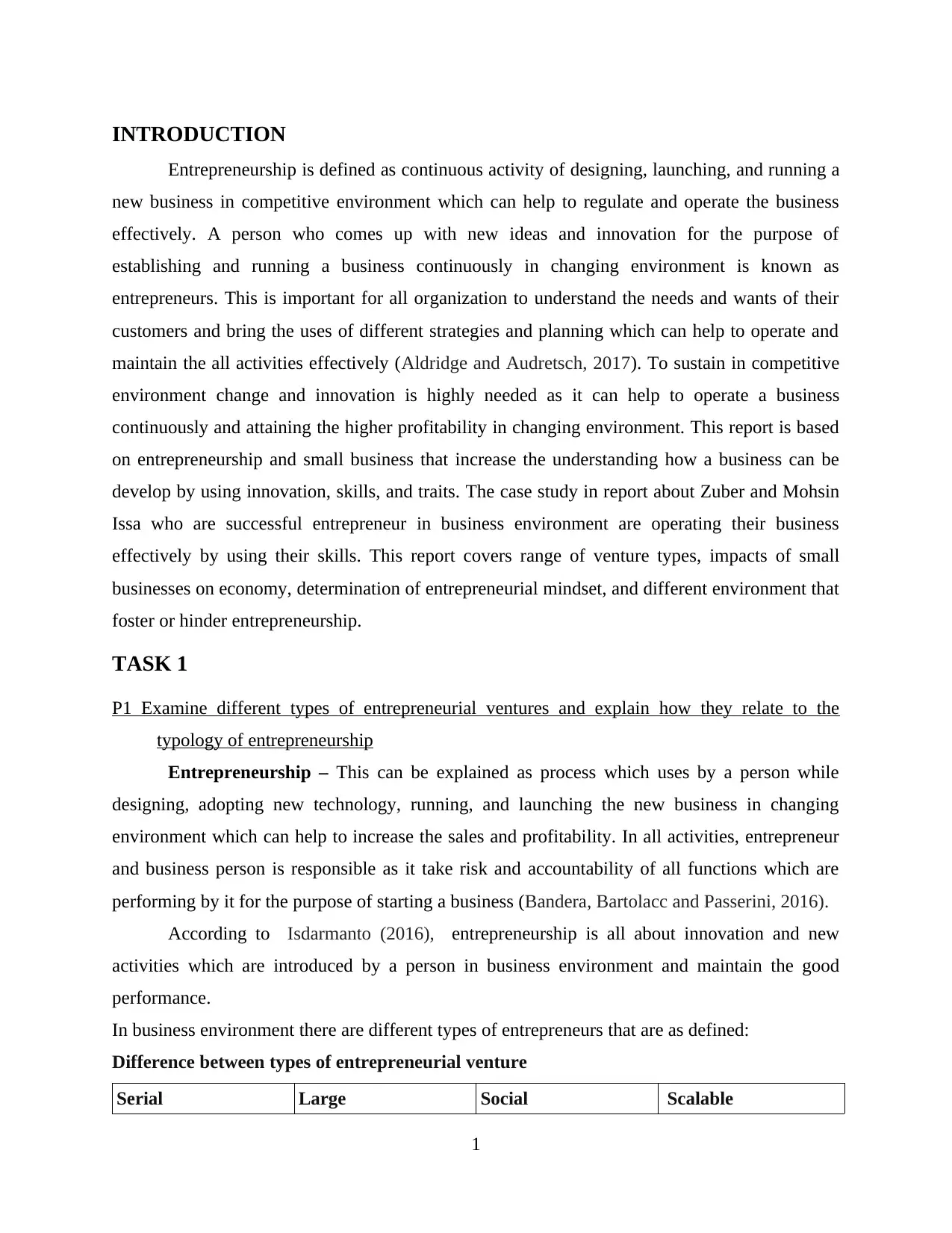
INTRODUCTION
Entrepreneurship is defined as continuous activity of designing, launching, and running a
new business in competitive environment which can help to regulate and operate the business
effectively. A person who comes up with new ideas and innovation for the purpose of
establishing and running a business continuously in changing environment is known as
entrepreneurs. This is important for all organization to understand the needs and wants of their
customers and bring the uses of different strategies and planning which can help to operate and
maintain the all activities effectively (Aldridge and Audretsch, 2017). To sustain in competitive
environment change and innovation is highly needed as it can help to operate a business
continuously and attaining the higher profitability in changing environment. This report is based
on entrepreneurship and small business that increase the understanding how a business can be
develop by using innovation, skills, and traits. The case study in report about Zuber and Mohsin
Issa who are successful entrepreneur in business environment are operating their business
effectively by using their skills. This report covers range of venture types, impacts of small
businesses on economy, determination of entrepreneurial mindset, and different environment that
foster or hinder entrepreneurship.
TASK 1
P1 Examine different types of entrepreneurial ventures and explain how they relate to the
typology of entrepreneurship
Entrepreneurship – This can be explained as process which uses by a person while
designing, adopting new technology, running, and launching the new business in changing
environment which can help to increase the sales and profitability. In all activities, entrepreneur
and business person is responsible as it take risk and accountability of all functions which are
performing by it for the purpose of starting a business (Bandera, Bartolacc and Passerini, 2016).
According to Isdarmanto (2016), entrepreneurship is all about innovation and new
activities which are introduced by a person in business environment and maintain the good
performance.
In business environment there are different types of entrepreneurs that are as defined:
Difference between types of entrepreneurial venture
Serial Large Social Scalable
1
Entrepreneurship is defined as continuous activity of designing, launching, and running a
new business in competitive environment which can help to regulate and operate the business
effectively. A person who comes up with new ideas and innovation for the purpose of
establishing and running a business continuously in changing environment is known as
entrepreneurs. This is important for all organization to understand the needs and wants of their
customers and bring the uses of different strategies and planning which can help to operate and
maintain the all activities effectively (Aldridge and Audretsch, 2017). To sustain in competitive
environment change and innovation is highly needed as it can help to operate a business
continuously and attaining the higher profitability in changing environment. This report is based
on entrepreneurship and small business that increase the understanding how a business can be
develop by using innovation, skills, and traits. The case study in report about Zuber and Mohsin
Issa who are successful entrepreneur in business environment are operating their business
effectively by using their skills. This report covers range of venture types, impacts of small
businesses on economy, determination of entrepreneurial mindset, and different environment that
foster or hinder entrepreneurship.
TASK 1
P1 Examine different types of entrepreneurial ventures and explain how they relate to the
typology of entrepreneurship
Entrepreneurship – This can be explained as process which uses by a person while
designing, adopting new technology, running, and launching the new business in changing
environment which can help to increase the sales and profitability. In all activities, entrepreneur
and business person is responsible as it take risk and accountability of all functions which are
performing by it for the purpose of starting a business (Bandera, Bartolacc and Passerini, 2016).
According to Isdarmanto (2016), entrepreneurship is all about innovation and new
activities which are introduced by a person in business environment and maintain the good
performance.
In business environment there are different types of entrepreneurs that are as defined:
Difference between types of entrepreneurial venture
Serial Large Social Scalable
1
Paraphrase This Document
Need a fresh take? Get an instant paraphrase of this document with our AI Paraphraser
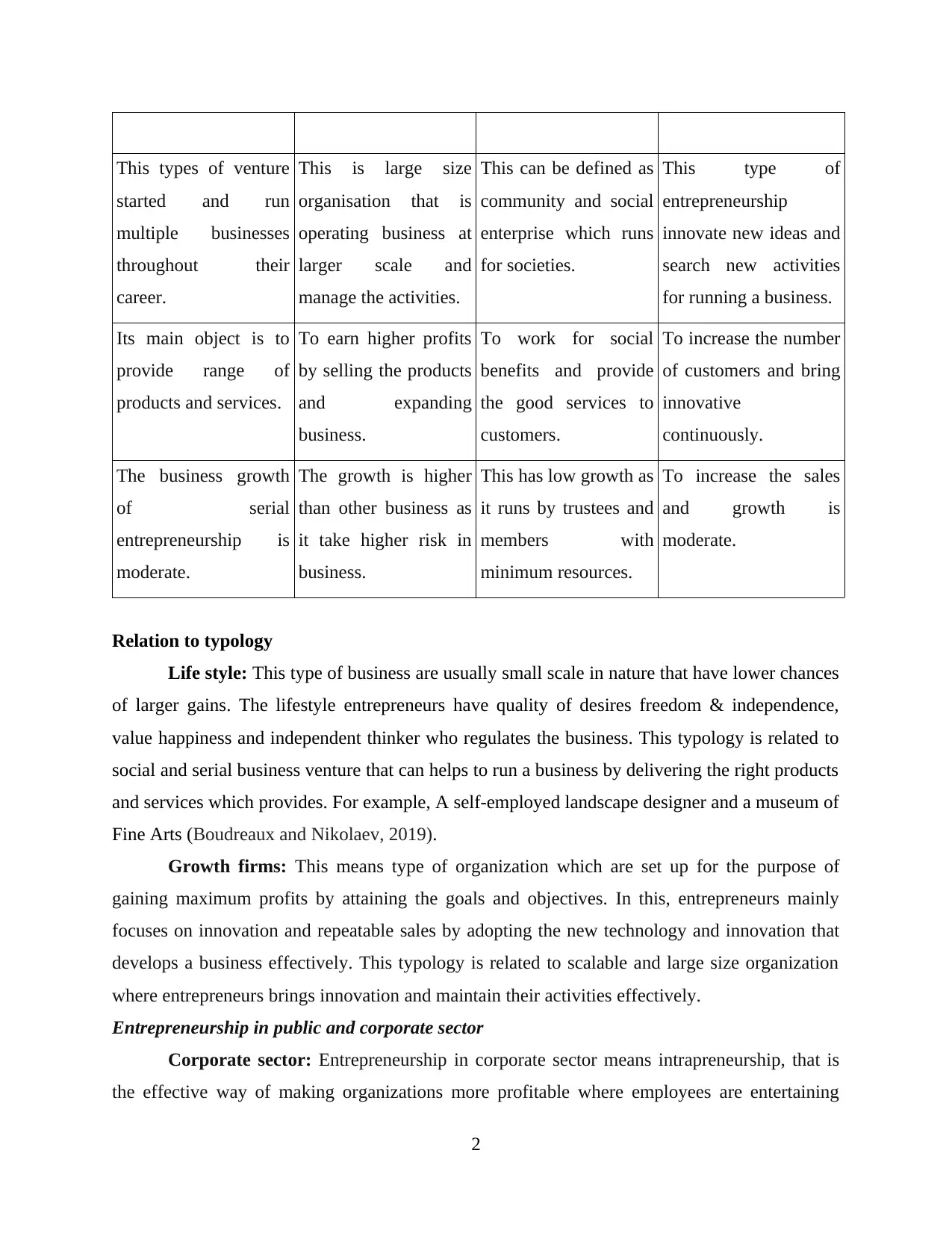
This types of venture
started and run
multiple businesses
throughout their
career.
This is large size
organisation that is
operating business at
larger scale and
manage the activities.
This can be defined as
community and social
enterprise which runs
for societies.
This type of
entrepreneurship
innovate new ideas and
search new activities
for running a business.
Its main object is to
provide range of
products and services.
To earn higher profits
by selling the products
and expanding
business.
To work for social
benefits and provide
the good services to
customers.
To increase the number
of customers and bring
innovative
continuously.
The business growth
of serial
entrepreneurship is
moderate.
The growth is higher
than other business as
it take higher risk in
business.
This has low growth as
it runs by trustees and
members with
minimum resources.
To increase the sales
and growth is
moderate.
Relation to typology
Life style: This type of business are usually small scale in nature that have lower chances
of larger gains. The lifestyle entrepreneurs have quality of desires freedom & independence,
value happiness and independent thinker who regulates the business. This typology is related to
social and serial business venture that can helps to run a business by delivering the right products
and services which provides. For example, A self-employed landscape designer and a museum of
Fine Arts (Boudreaux and Nikolaev, 2019).
Growth firms: This means type of organization which are set up for the purpose of
gaining maximum profits by attaining the goals and objectives. In this, entrepreneurs mainly
focuses on innovation and repeatable sales by adopting the new technology and innovation that
develops a business effectively. This typology is related to scalable and large size organization
where entrepreneurs brings innovation and maintain their activities effectively.
Entrepreneurship in public and corporate sector
Corporate sector: Entrepreneurship in corporate sector means intrapreneurship, that is
the effective way of making organizations more profitable where employees are entertaining
2
started and run
multiple businesses
throughout their
career.
This is large size
organisation that is
operating business at
larger scale and
manage the activities.
This can be defined as
community and social
enterprise which runs
for societies.
This type of
entrepreneurship
innovate new ideas and
search new activities
for running a business.
Its main object is to
provide range of
products and services.
To earn higher profits
by selling the products
and expanding
business.
To work for social
benefits and provide
the good services to
customers.
To increase the number
of customers and bring
innovative
continuously.
The business growth
of serial
entrepreneurship is
moderate.
The growth is higher
than other business as
it take higher risk in
business.
This has low growth as
it runs by trustees and
members with
minimum resources.
To increase the sales
and growth is
moderate.
Relation to typology
Life style: This type of business are usually small scale in nature that have lower chances
of larger gains. The lifestyle entrepreneurs have quality of desires freedom & independence,
value happiness and independent thinker who regulates the business. This typology is related to
social and serial business venture that can helps to run a business by delivering the right products
and services which provides. For example, A self-employed landscape designer and a museum of
Fine Arts (Boudreaux and Nikolaev, 2019).
Growth firms: This means type of organization which are set up for the purpose of
gaining maximum profits by attaining the goals and objectives. In this, entrepreneurs mainly
focuses on innovation and repeatable sales by adopting the new technology and innovation that
develops a business effectively. This typology is related to scalable and large size organization
where entrepreneurs brings innovation and maintain their activities effectively.
Entrepreneurship in public and corporate sector
Corporate sector: Entrepreneurship in corporate sector means intrapreneurship, that is
the effective way of making organizations more profitable where employees are entertaining
2
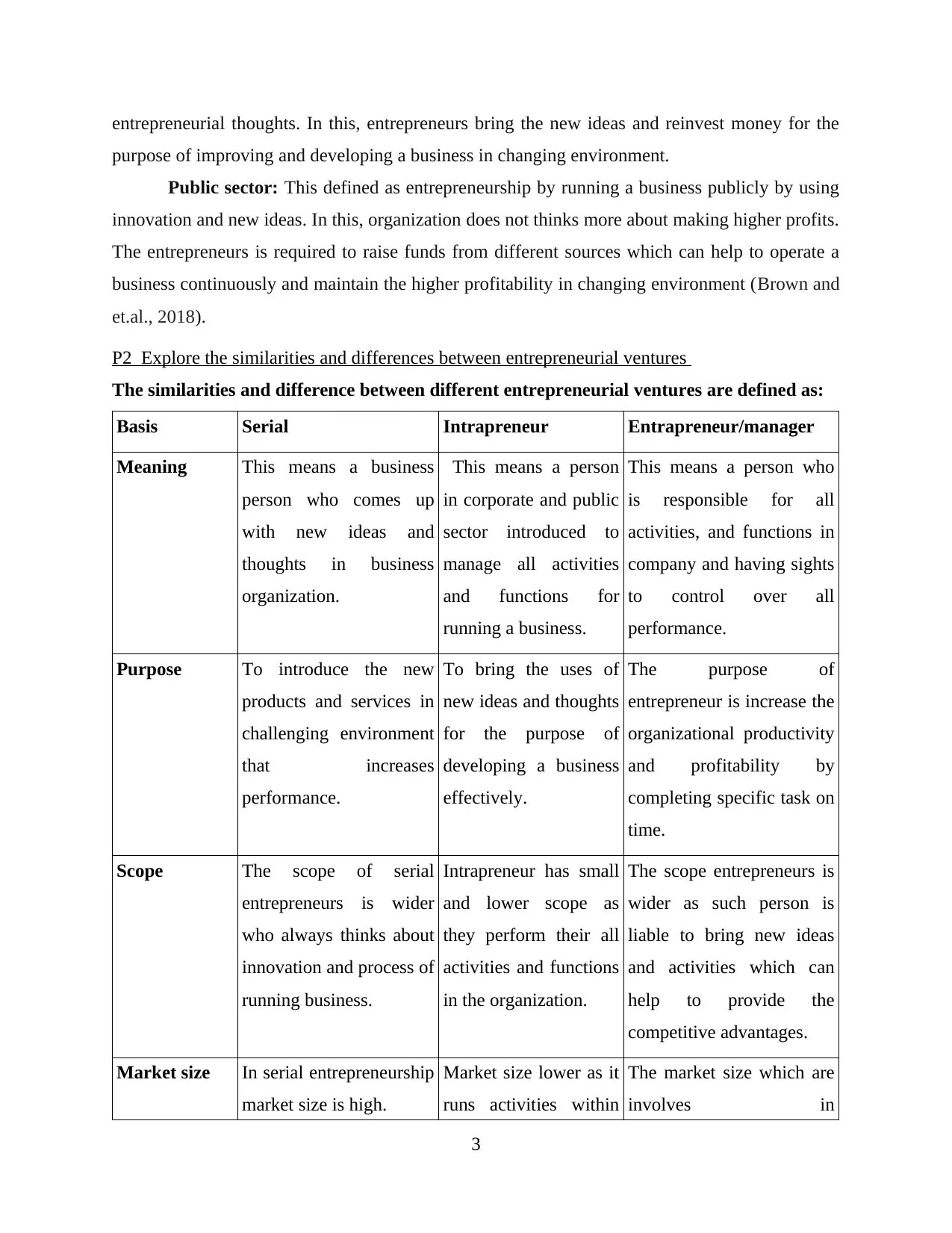
entrepreneurial thoughts. In this, entrepreneurs bring the new ideas and reinvest money for the
purpose of improving and developing a business in changing environment.
Public sector: This defined as entrepreneurship by running a business publicly by using
innovation and new ideas. In this, organization does not thinks more about making higher profits.
The entrepreneurs is required to raise funds from different sources which can help to operate a
business continuously and maintain the higher profitability in changing environment (Brown and
et.al., 2018).
P2 Explore the similarities and differences between entrepreneurial ventures
The similarities and difference between different entrepreneurial ventures are defined as:
Basis Serial Intrapreneur Entrapreneur/manager
Meaning This means a business
person who comes up
with new ideas and
thoughts in business
organization.
This means a person
in corporate and public
sector introduced to
manage all activities
and functions for
running a business.
This means a person who
is responsible for all
activities, and functions in
company and having sights
to control over all
performance.
Purpose To introduce the new
products and services in
challenging environment
that increases
performance.
To bring the uses of
new ideas and thoughts
for the purpose of
developing a business
effectively.
The purpose of
entrepreneur is increase the
organizational productivity
and profitability by
completing specific task on
time.
Scope The scope of serial
entrepreneurs is wider
who always thinks about
innovation and process of
running business.
Intrapreneur has small
and lower scope as
they perform their all
activities and functions
in the organization.
The scope entrepreneurs is
wider as such person is
liable to bring new ideas
and activities which can
help to provide the
competitive advantages.
Market size In serial entrepreneurship
market size is high.
Market size lower as it
runs activities within
The market size which are
involves in
3
purpose of improving and developing a business in changing environment.
Public sector: This defined as entrepreneurship by running a business publicly by using
innovation and new ideas. In this, organization does not thinks more about making higher profits.
The entrepreneurs is required to raise funds from different sources which can help to operate a
business continuously and maintain the higher profitability in changing environment (Brown and
et.al., 2018).
P2 Explore the similarities and differences between entrepreneurial ventures
The similarities and difference between different entrepreneurial ventures are defined as:
Basis Serial Intrapreneur Entrapreneur/manager
Meaning This means a business
person who comes up
with new ideas and
thoughts in business
organization.
This means a person
in corporate and public
sector introduced to
manage all activities
and functions for
running a business.
This means a person who
is responsible for all
activities, and functions in
company and having sights
to control over all
performance.
Purpose To introduce the new
products and services in
challenging environment
that increases
performance.
To bring the uses of
new ideas and thoughts
for the purpose of
developing a business
effectively.
The purpose of
entrepreneur is increase the
organizational productivity
and profitability by
completing specific task on
time.
Scope The scope of serial
entrepreneurs is wider
who always thinks about
innovation and process of
running business.
Intrapreneur has small
and lower scope as
they perform their all
activities and functions
in the organization.
The scope entrepreneurs is
wider as such person is
liable to bring new ideas
and activities which can
help to provide the
competitive advantages.
Market size In serial entrepreneurship
market size is high.
Market size lower as it
runs activities within
The market size which are
involves in
3
⊘ This is a preview!⊘
Do you want full access?
Subscribe today to unlock all pages.

Trusted by 1+ million students worldwide
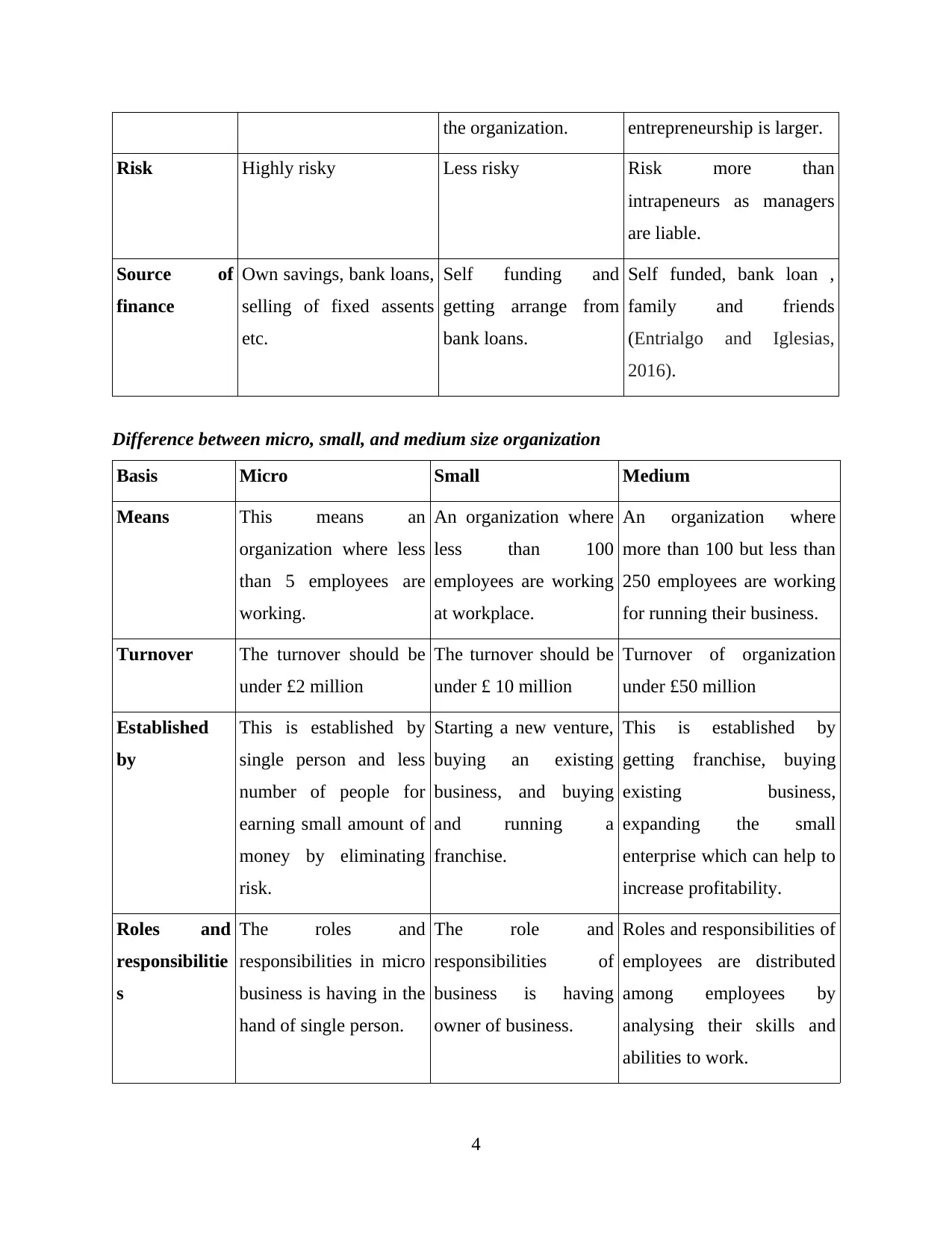
the organization. entrepreneurship is larger.
Risk Highly risky Less risky Risk more than
intrapeneurs as managers
are liable.
Source of
finance
Own savings, bank loans,
selling of fixed assents
etc.
Self funding and
getting arrange from
bank loans.
Self funded, bank loan ,
family and friends
(Entrialgo and Iglesias,
2016).
Difference between micro, small, and medium size organization
Basis Micro Small Medium
Means This means an
organization where less
than 5 employees are
working.
An organization where
less than 100
employees are working
at workplace.
An organization where
more than 100 but less than
250 employees are working
for running their business.
Turnover The turnover should be
under £2 million
The turnover should be
under £ 10 million
Turnover of organization
under £50 million
Established
by
This is established by
single person and less
number of people for
earning small amount of
money by eliminating
risk.
Starting a new venture,
buying an existing
business, and buying
and running a
franchise.
This is established by
getting franchise, buying
existing business,
expanding the small
enterprise which can help to
increase profitability.
Roles and
responsibilitie
s
The roles and
responsibilities in micro
business is having in the
hand of single person.
The role and
responsibilities of
business is having
owner of business.
Roles and responsibilities of
employees are distributed
among employees by
analysing their skills and
abilities to work.
4
Risk Highly risky Less risky Risk more than
intrapeneurs as managers
are liable.
Source of
finance
Own savings, bank loans,
selling of fixed assents
etc.
Self funding and
getting arrange from
bank loans.
Self funded, bank loan ,
family and friends
(Entrialgo and Iglesias,
2016).
Difference between micro, small, and medium size organization
Basis Micro Small Medium
Means This means an
organization where less
than 5 employees are
working.
An organization where
less than 100
employees are working
at workplace.
An organization where
more than 100 but less than
250 employees are working
for running their business.
Turnover The turnover should be
under £2 million
The turnover should be
under £ 10 million
Turnover of organization
under £50 million
Established
by
This is established by
single person and less
number of people for
earning small amount of
money by eliminating
risk.
Starting a new venture,
buying an existing
business, and buying
and running a
franchise.
This is established by
getting franchise, buying
existing business,
expanding the small
enterprise which can help to
increase profitability.
Roles and
responsibilitie
s
The roles and
responsibilities in micro
business is having in the
hand of single person.
The role and
responsibilities of
business is having
owner of business.
Roles and responsibilities of
employees are distributed
among employees by
analysing their skills and
abilities to work.
4
Paraphrase This Document
Need a fresh take? Get an instant paraphrase of this document with our AI Paraphraser
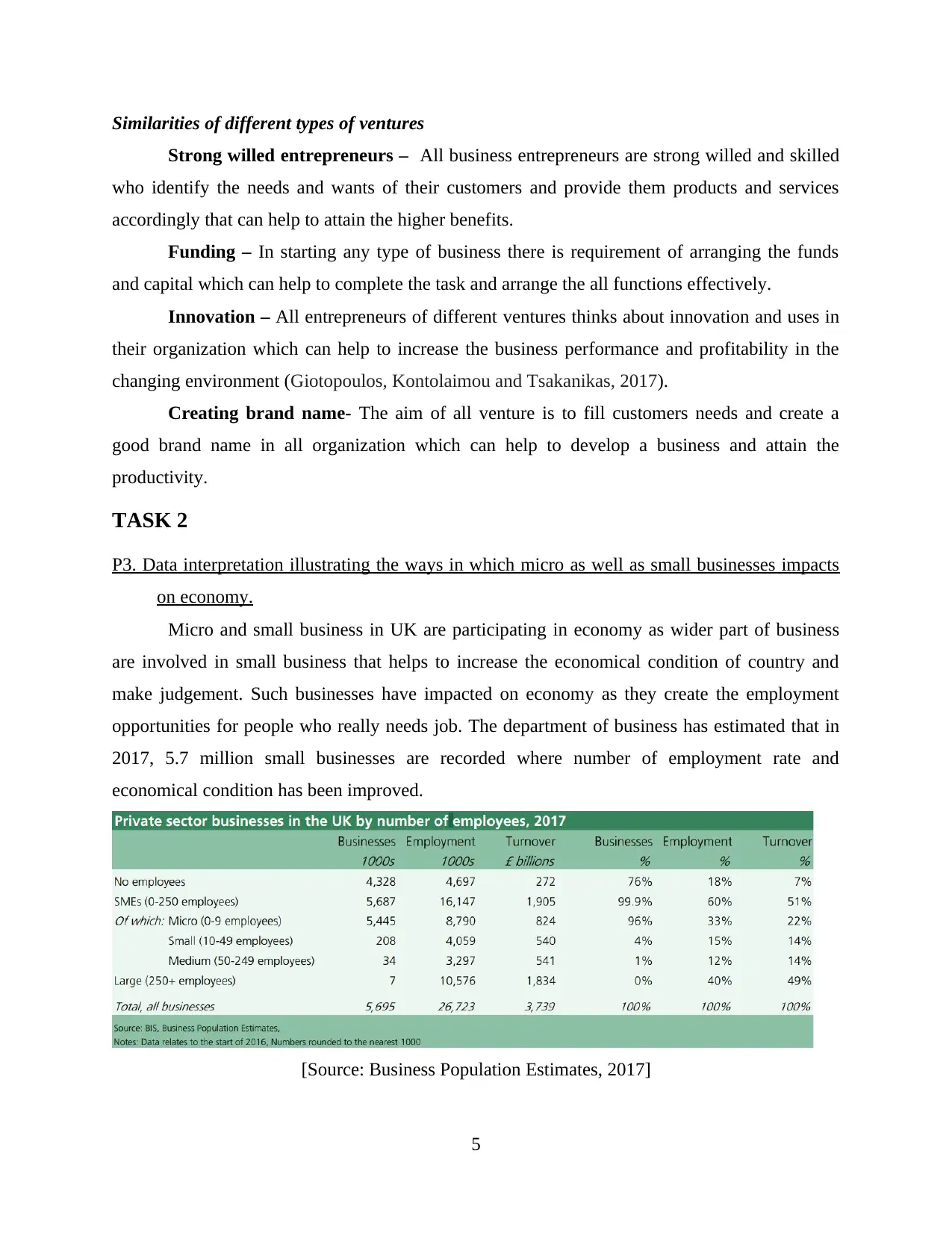
Similarities of different types of ventures
Strong willed entrepreneurs – All business entrepreneurs are strong willed and skilled
who identify the needs and wants of their customers and provide them products and services
accordingly that can help to attain the higher benefits.
Funding – In starting any type of business there is requirement of arranging the funds
and capital which can help to complete the task and arrange the all functions effectively.
Innovation – All entrepreneurs of different ventures thinks about innovation and uses in
their organization which can help to increase the business performance and profitability in the
changing environment (Giotopoulos, Kontolaimou and Tsakanikas, 2017).
Creating brand name- The aim of all venture is to fill customers needs and create a
good brand name in all organization which can help to develop a business and attain the
productivity.
TASK 2
P3. Data interpretation illustrating the ways in which micro as well as small businesses impacts
on economy.
Micro and small business in UK are participating in economy as wider part of business
are involved in small business that helps to increase the economical condition of country and
make judgement. Such businesses have impacted on economy as they create the employment
opportunities for people who really needs job. The department of business has estimated that in
2017, 5.7 million small businesses are recorded where number of employment rate and
economical condition has been improved.
[Source: Business Population Estimates, 2017]
5
Strong willed entrepreneurs – All business entrepreneurs are strong willed and skilled
who identify the needs and wants of their customers and provide them products and services
accordingly that can help to attain the higher benefits.
Funding – In starting any type of business there is requirement of arranging the funds
and capital which can help to complete the task and arrange the all functions effectively.
Innovation – All entrepreneurs of different ventures thinks about innovation and uses in
their organization which can help to increase the business performance and profitability in the
changing environment (Giotopoulos, Kontolaimou and Tsakanikas, 2017).
Creating brand name- The aim of all venture is to fill customers needs and create a
good brand name in all organization which can help to develop a business and attain the
productivity.
TASK 2
P3. Data interpretation illustrating the ways in which micro as well as small businesses impacts
on economy.
Micro and small business in UK are participating in economy as wider part of business
are involved in small business that helps to increase the economical condition of country and
make judgement. Such businesses have impacted on economy as they create the employment
opportunities for people who really needs job. The department of business has estimated that in
2017, 5.7 million small businesses are recorded where number of employment rate and
economical condition has been improved.
[Source: Business Population Estimates, 2017]
5
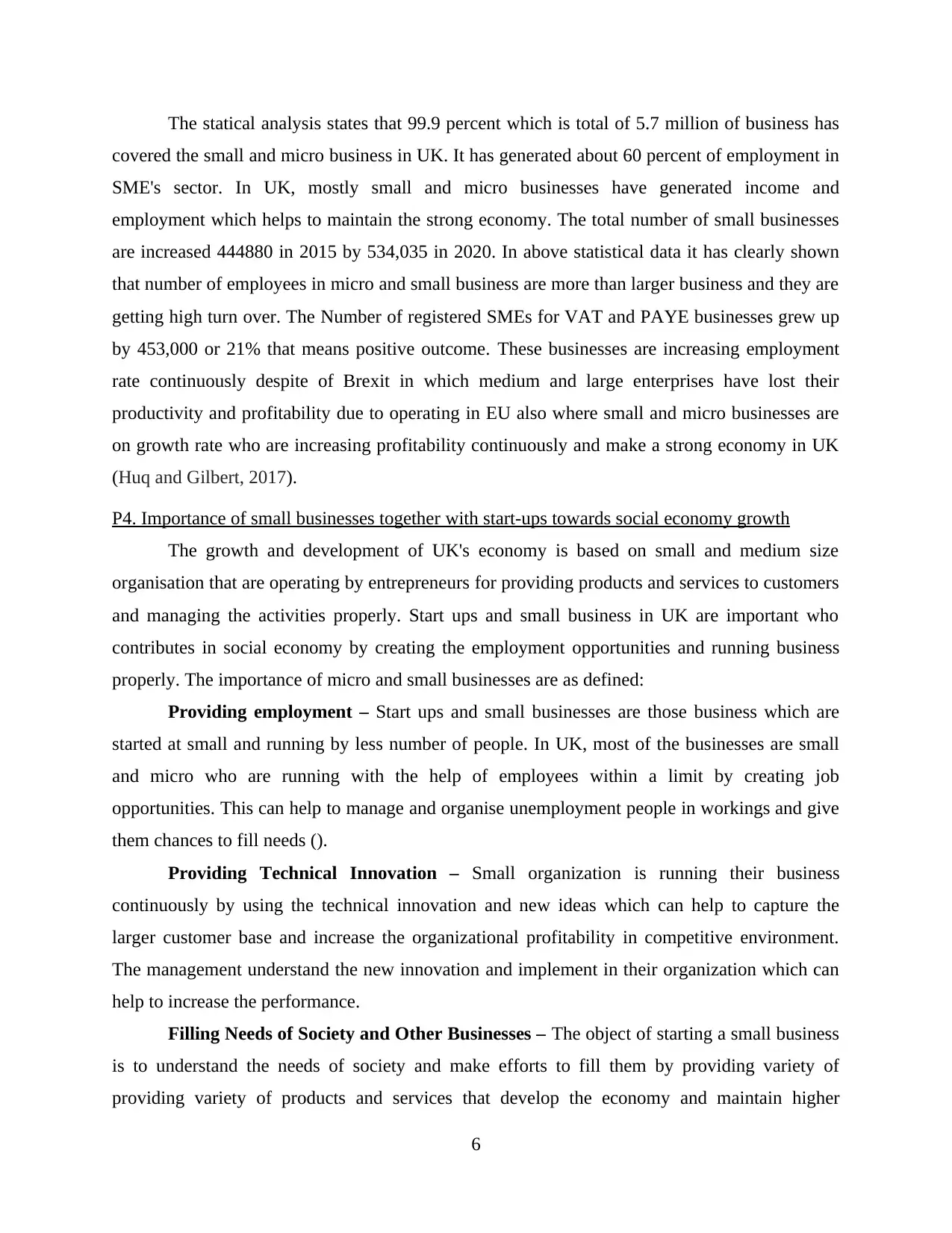
The statical analysis states that 99.9 percent which is total of 5.7 million of business has
covered the small and micro business in UK. It has generated about 60 percent of employment in
SME's sector. In UK, mostly small and micro businesses have generated income and
employment which helps to maintain the strong economy. The total number of small businesses
are increased 444880 in 2015 by 534,035 in 2020. In above statistical data it has clearly shown
that number of employees in micro and small business are more than larger business and they are
getting high turn over. The Number of registered SMEs for VAT and PAYE businesses grew up
by 453,000 or 21% that means positive outcome. These businesses are increasing employment
rate continuously despite of Brexit in which medium and large enterprises have lost their
productivity and profitability due to operating in EU also where small and micro businesses are
on growth rate who are increasing profitability continuously and make a strong economy in UK
(Huq and Gilbert, 2017).
P4. Importance of small businesses together with start-ups towards social economy growth
The growth and development of UK's economy is based on small and medium size
organisation that are operating by entrepreneurs for providing products and services to customers
and managing the activities properly. Start ups and small business in UK are important who
contributes in social economy by creating the employment opportunities and running business
properly. The importance of micro and small businesses are as defined:
Providing employment – Start ups and small businesses are those business which are
started at small and running by less number of people. In UK, most of the businesses are small
and micro who are running with the help of employees within a limit by creating job
opportunities. This can help to manage and organise unemployment people in workings and give
them chances to fill needs ().
Providing Technical Innovation – Small organization is running their business
continuously by using the technical innovation and new ideas which can help to capture the
larger customer base and increase the organizational profitability in competitive environment.
The management understand the new innovation and implement in their organization which can
help to increase the performance.
Filling Needs of Society and Other Businesses – The object of starting a small business
is to understand the needs of society and make efforts to fill them by providing variety of
providing variety of products and services that develop the economy and maintain higher
6
covered the small and micro business in UK. It has generated about 60 percent of employment in
SME's sector. In UK, mostly small and micro businesses have generated income and
employment which helps to maintain the strong economy. The total number of small businesses
are increased 444880 in 2015 by 534,035 in 2020. In above statistical data it has clearly shown
that number of employees in micro and small business are more than larger business and they are
getting high turn over. The Number of registered SMEs for VAT and PAYE businesses grew up
by 453,000 or 21% that means positive outcome. These businesses are increasing employment
rate continuously despite of Brexit in which medium and large enterprises have lost their
productivity and profitability due to operating in EU also where small and micro businesses are
on growth rate who are increasing profitability continuously and make a strong economy in UK
(Huq and Gilbert, 2017).
P4. Importance of small businesses together with start-ups towards social economy growth
The growth and development of UK's economy is based on small and medium size
organisation that are operating by entrepreneurs for providing products and services to customers
and managing the activities properly. Start ups and small business in UK are important who
contributes in social economy by creating the employment opportunities and running business
properly. The importance of micro and small businesses are as defined:
Providing employment – Start ups and small businesses are those business which are
started at small and running by less number of people. In UK, most of the businesses are small
and micro who are running with the help of employees within a limit by creating job
opportunities. This can help to manage and organise unemployment people in workings and give
them chances to fill needs ().
Providing Technical Innovation – Small organization is running their business
continuously by using the technical innovation and new ideas which can help to capture the
larger customer base and increase the organizational profitability in competitive environment.
The management understand the new innovation and implement in their organization which can
help to increase the performance.
Filling Needs of Society and Other Businesses – The object of starting a small business
is to understand the needs of society and make efforts to fill them by providing variety of
providing variety of products and services that develop the economy and maintain higher
6
⊘ This is a preview!⊘
Do you want full access?
Subscribe today to unlock all pages.

Trusted by 1+ million students worldwide
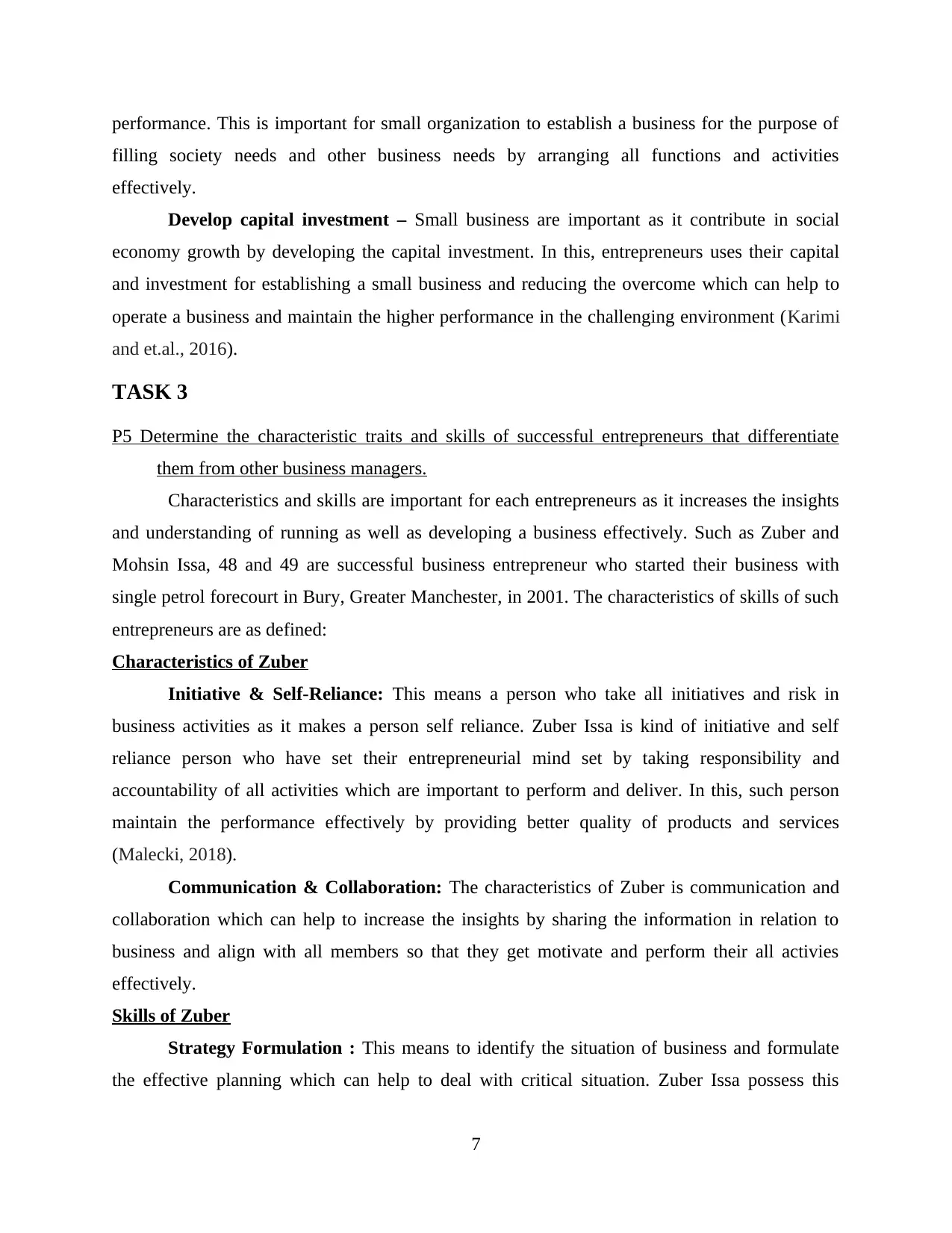
performance. This is important for small organization to establish a business for the purpose of
filling society needs and other business needs by arranging all functions and activities
effectively.
Develop capital investment – Small business are important as it contribute in social
economy growth by developing the capital investment. In this, entrepreneurs uses their capital
and investment for establishing a small business and reducing the overcome which can help to
operate a business and maintain the higher performance in the challenging environment (Karimi
and et.al., 2016).
TASK 3
P5 Determine the characteristic traits and skills of successful entrepreneurs that differentiate
them from other business managers.
Characteristics and skills are important for each entrepreneurs as it increases the insights
and understanding of running as well as developing a business effectively. Such as Zuber and
Mohsin Issa, 48 and 49 are successful business entrepreneur who started their business with
single petrol forecourt in Bury, Greater Manchester, in 2001. The characteristics of skills of such
entrepreneurs are as defined:
Characteristics of Zuber
Initiative & Self-Reliance: This means a person who take all initiatives and risk in
business activities as it makes a person self reliance. Zuber Issa is kind of initiative and self
reliance person who have set their entrepreneurial mind set by taking responsibility and
accountability of all activities which are important to perform and deliver. In this, such person
maintain the performance effectively by providing better quality of products and services
(Malecki, 2018).
Communication & Collaboration: The characteristics of Zuber is communication and
collaboration which can help to increase the insights by sharing the information in relation to
business and align with all members so that they get motivate and perform their all activies
effectively.
Skills of Zuber
Strategy Formulation : This means to identify the situation of business and formulate
the effective planning which can help to deal with critical situation. Zuber Issa possess this
7
filling society needs and other business needs by arranging all functions and activities
effectively.
Develop capital investment – Small business are important as it contribute in social
economy growth by developing the capital investment. In this, entrepreneurs uses their capital
and investment for establishing a small business and reducing the overcome which can help to
operate a business and maintain the higher performance in the challenging environment (Karimi
and et.al., 2016).
TASK 3
P5 Determine the characteristic traits and skills of successful entrepreneurs that differentiate
them from other business managers.
Characteristics and skills are important for each entrepreneurs as it increases the insights
and understanding of running as well as developing a business effectively. Such as Zuber and
Mohsin Issa, 48 and 49 are successful business entrepreneur who started their business with
single petrol forecourt in Bury, Greater Manchester, in 2001. The characteristics of skills of such
entrepreneurs are as defined:
Characteristics of Zuber
Initiative & Self-Reliance: This means a person who take all initiatives and risk in
business activities as it makes a person self reliance. Zuber Issa is kind of initiative and self
reliance person who have set their entrepreneurial mind set by taking responsibility and
accountability of all activities which are important to perform and deliver. In this, such person
maintain the performance effectively by providing better quality of products and services
(Malecki, 2018).
Communication & Collaboration: The characteristics of Zuber is communication and
collaboration which can help to increase the insights by sharing the information in relation to
business and align with all members so that they get motivate and perform their all activies
effectively.
Skills of Zuber
Strategy Formulation : This means to identify the situation of business and formulate
the effective planning which can help to deal with critical situation. Zuber Issa possess this
7
Paraphrase This Document
Need a fresh take? Get an instant paraphrase of this document with our AI Paraphraser
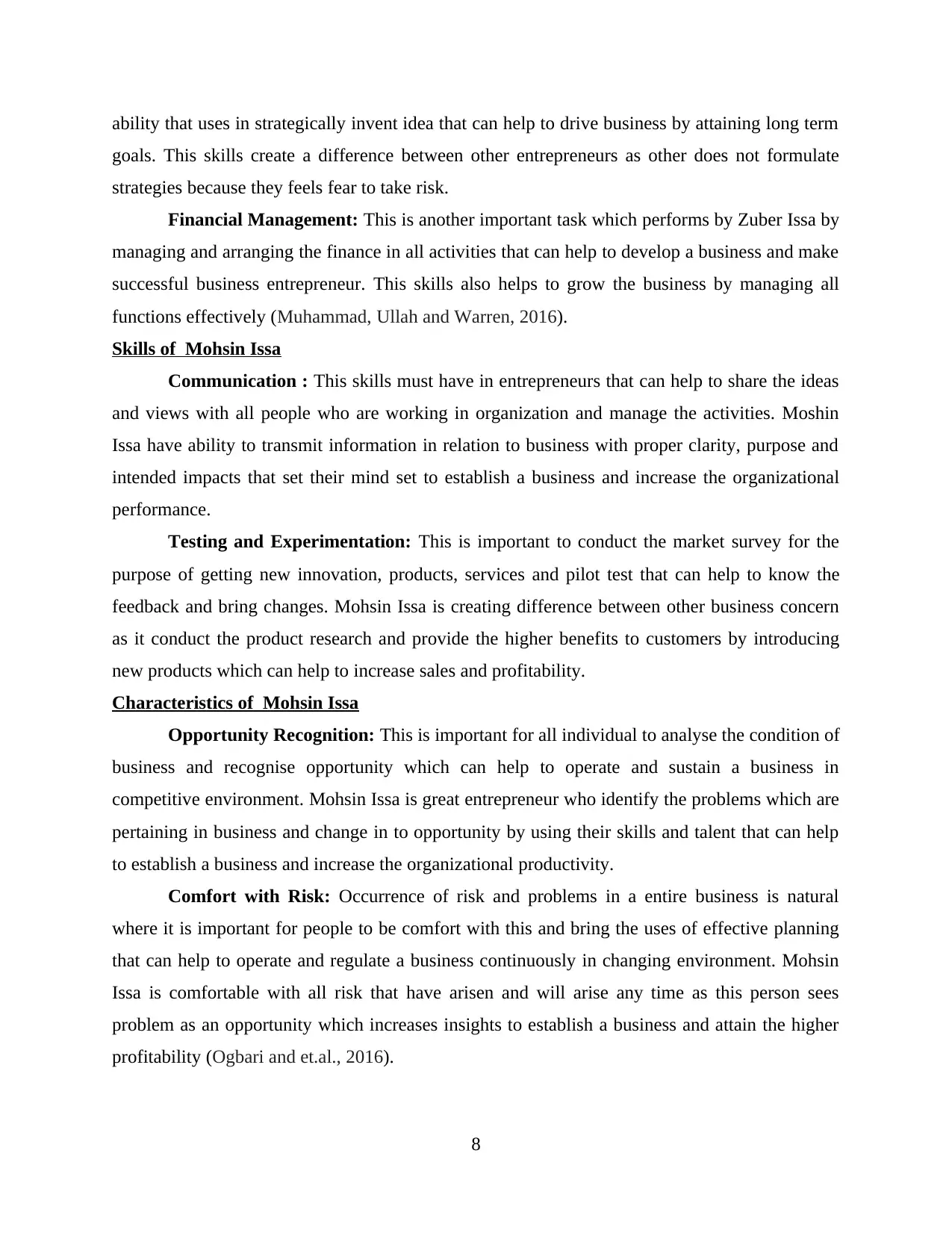
ability that uses in strategically invent idea that can help to drive business by attaining long term
goals. This skills create a difference between other entrepreneurs as other does not formulate
strategies because they feels fear to take risk.
Financial Management: This is another important task which performs by Zuber Issa by
managing and arranging the finance in all activities that can help to develop a business and make
successful business entrepreneur. This skills also helps to grow the business by managing all
functions effectively (Muhammad, Ullah and Warren, 2016).
Skills of Mohsin Issa
Communication : This skills must have in entrepreneurs that can help to share the ideas
and views with all people who are working in organization and manage the activities. Moshin
Issa have ability to transmit information in relation to business with proper clarity, purpose and
intended impacts that set their mind set to establish a business and increase the organizational
performance.
Testing and Experimentation: This is important to conduct the market survey for the
purpose of getting new innovation, products, services and pilot test that can help to know the
feedback and bring changes. Mohsin Issa is creating difference between other business concern
as it conduct the product research and provide the higher benefits to customers by introducing
new products which can help to increase sales and profitability.
Characteristics of Mohsin Issa
Opportunity Recognition: This is important for all individual to analyse the condition of
business and recognise opportunity which can help to operate and sustain a business in
competitive environment. Mohsin Issa is great entrepreneur who identify the problems which are
pertaining in business and change in to opportunity by using their skills and talent that can help
to establish a business and increase the organizational productivity.
Comfort with Risk: Occurrence of risk and problems in a entire business is natural
where it is important for people to be comfort with this and bring the uses of effective planning
that can help to operate and regulate a business continuously in changing environment. Mohsin
Issa is comfortable with all risk that have arisen and will arise any time as this person sees
problem as an opportunity which increases insights to establish a business and attain the higher
profitability (Ogbari and et.al., 2016).
8
goals. This skills create a difference between other entrepreneurs as other does not formulate
strategies because they feels fear to take risk.
Financial Management: This is another important task which performs by Zuber Issa by
managing and arranging the finance in all activities that can help to develop a business and make
successful business entrepreneur. This skills also helps to grow the business by managing all
functions effectively (Muhammad, Ullah and Warren, 2016).
Skills of Mohsin Issa
Communication : This skills must have in entrepreneurs that can help to share the ideas
and views with all people who are working in organization and manage the activities. Moshin
Issa have ability to transmit information in relation to business with proper clarity, purpose and
intended impacts that set their mind set to establish a business and increase the organizational
performance.
Testing and Experimentation: This is important to conduct the market survey for the
purpose of getting new innovation, products, services and pilot test that can help to know the
feedback and bring changes. Mohsin Issa is creating difference between other business concern
as it conduct the product research and provide the higher benefits to customers by introducing
new products which can help to increase sales and profitability.
Characteristics of Mohsin Issa
Opportunity Recognition: This is important for all individual to analyse the condition of
business and recognise opportunity which can help to operate and sustain a business in
competitive environment. Mohsin Issa is great entrepreneur who identify the problems which are
pertaining in business and change in to opportunity by using their skills and talent that can help
to establish a business and increase the organizational productivity.
Comfort with Risk: Occurrence of risk and problems in a entire business is natural
where it is important for people to be comfort with this and bring the uses of effective planning
that can help to operate and regulate a business continuously in changing environment. Mohsin
Issa is comfortable with all risk that have arisen and will arise any time as this person sees
problem as an opportunity which increases insights to establish a business and attain the higher
profitability (Ogbari and et.al., 2016).
8
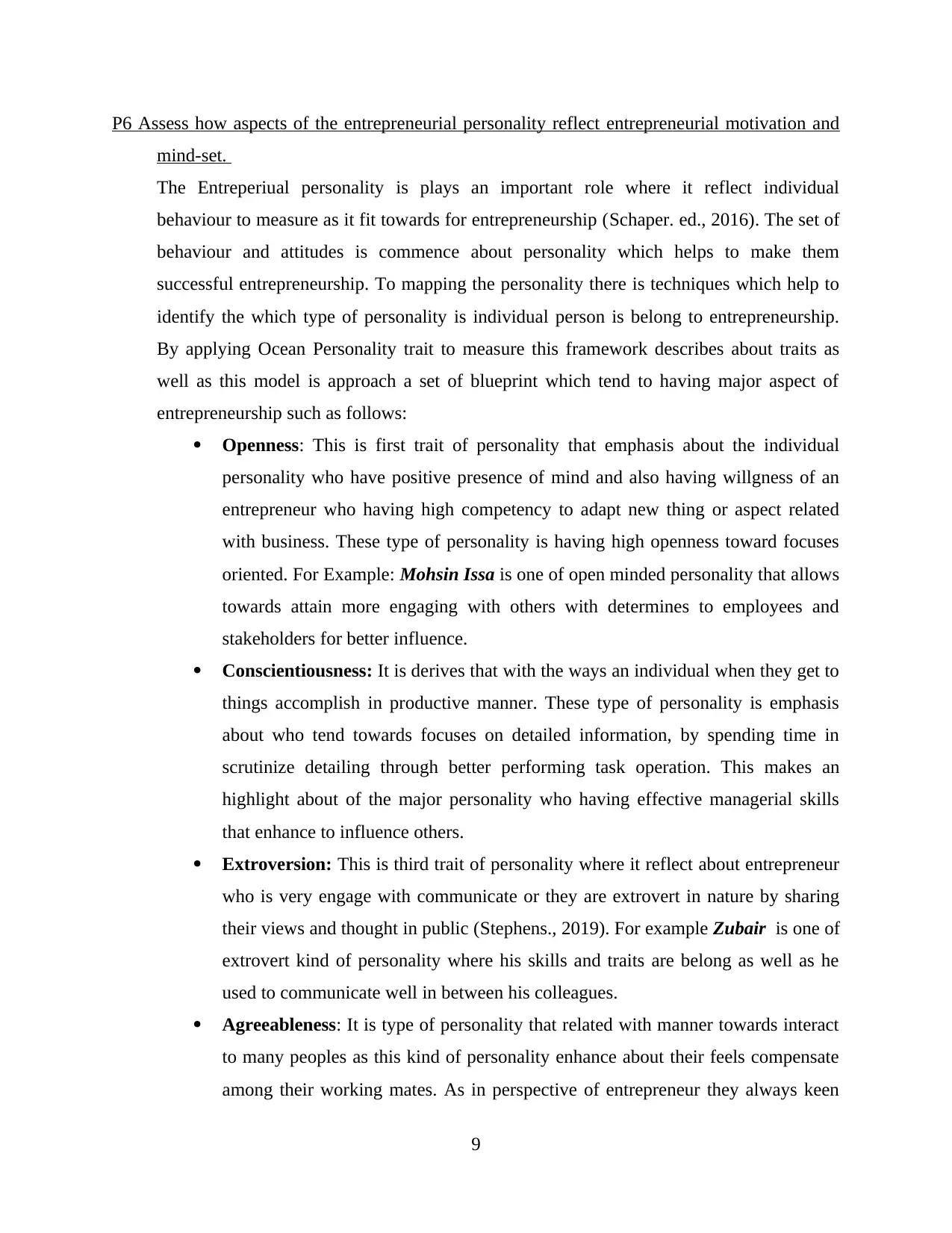
P6 Assess how aspects of the entrepreneurial personality reflect entrepreneurial motivation and
mind-set.
The Entreperiual personality is plays an important role where it reflect individual
behaviour to measure as it fit towards for entrepreneurship (Schaper. ed., 2016). The set of
behaviour and attitudes is commence about personality which helps to make them
successful entrepreneurship. To mapping the personality there is techniques which help to
identify the which type of personality is individual person is belong to entrepreneurship.
By applying Ocean Personality trait to measure this framework describes about traits as
well as this model is approach a set of blueprint which tend to having major aspect of
entrepreneurship such as follows:
Openness: This is first trait of personality that emphasis about the individual
personality who have positive presence of mind and also having willgness of an
entrepreneur who having high competency to adapt new thing or aspect related
with business. These type of personality is having high openness toward focuses
oriented. For Example: Mohsin Issa is one of open minded personality that allows
towards attain more engaging with others with determines to employees and
stakeholders for better influence.
Conscientiousness: It is derives that with the ways an individual when they get to
things accomplish in productive manner. These type of personality is emphasis
about who tend towards focuses on detailed information, by spending time in
scrutinize detailing through better performing task operation. This makes an
highlight about of the major personality who having effective managerial skills
that enhance to influence others.
Extroversion: This is third trait of personality where it reflect about entrepreneur
who is very engage with communicate or they are extrovert in nature by sharing
their views and thought in public (Stephens., 2019). For example Zubair is one of
extrovert kind of personality where his skills and traits are belong as well as he
used to communicate well in between his colleagues.
Agreeableness: It is type of personality that related with manner towards interact
to many peoples as this kind of personality enhance about their feels compensate
among their working mates. As in perspective of entrepreneur they always keen
9
mind-set.
The Entreperiual personality is plays an important role where it reflect individual
behaviour to measure as it fit towards for entrepreneurship (Schaper. ed., 2016). The set of
behaviour and attitudes is commence about personality which helps to make them
successful entrepreneurship. To mapping the personality there is techniques which help to
identify the which type of personality is individual person is belong to entrepreneurship.
By applying Ocean Personality trait to measure this framework describes about traits as
well as this model is approach a set of blueprint which tend to having major aspect of
entrepreneurship such as follows:
Openness: This is first trait of personality that emphasis about the individual
personality who have positive presence of mind and also having willgness of an
entrepreneur who having high competency to adapt new thing or aspect related
with business. These type of personality is having high openness toward focuses
oriented. For Example: Mohsin Issa is one of open minded personality that allows
towards attain more engaging with others with determines to employees and
stakeholders for better influence.
Conscientiousness: It is derives that with the ways an individual when they get to
things accomplish in productive manner. These type of personality is emphasis
about who tend towards focuses on detailed information, by spending time in
scrutinize detailing through better performing task operation. This makes an
highlight about of the major personality who having effective managerial skills
that enhance to influence others.
Extroversion: This is third trait of personality where it reflect about entrepreneur
who is very engage with communicate or they are extrovert in nature by sharing
their views and thought in public (Stephens., 2019). For example Zubair is one of
extrovert kind of personality where his skills and traits are belong as well as he
used to communicate well in between his colleagues.
Agreeableness: It is type of personality that related with manner towards interact
to many peoples as this kind of personality enhance about their feels compensate
among their working mates. As in perspective of entrepreneur they always keen
9
⊘ This is a preview!⊘
Do you want full access?
Subscribe today to unlock all pages.

Trusted by 1+ million students worldwide
1 out of 16
Related Documents
Your All-in-One AI-Powered Toolkit for Academic Success.
+13062052269
info@desklib.com
Available 24*7 on WhatsApp / Email
![[object Object]](/_next/static/media/star-bottom.7253800d.svg)
Unlock your academic potential
Copyright © 2020–2026 A2Z Services. All Rights Reserved. Developed and managed by ZUCOL.



